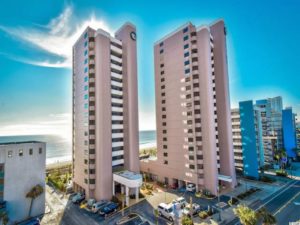Being a condo expert comes with its challenges when representing both sellers and buyers. With the tragedy in Surfside Florida comes what will likely be sweeping changes to mid & high-rise condominium ownership policies. Coupled with the newly added expenses. So does this mean high-rise condos will strictly be for the very wealthy? They almost were already, but I suspect it to get worse. Is the South Carolina coastal high-rise market poised to be the next one?
 First, you must understand how condo ownership works, and then it will become much clearer as to why I suspect the cost of ownership to increase substantially going forward. As a real estate broker with over 23 years in the real estate industry from founding and running a mortgage firm to being a real estate broker with a team I have seen just about everything. One of my personal specialties is single-family attached homes (i.e. condos & townhouses). Most specifically luxury condos. One of my team’s major markets is Myrtle Beach SC, where there are over a hundred oceanfront highrise condominiums.
First, you must understand how condo ownership works, and then it will become much clearer as to why I suspect the cost of ownership to increase substantially going forward. As a real estate broker with over 23 years in the real estate industry from founding and running a mortgage firm to being a real estate broker with a team I have seen just about everything. One of my personal specialties is single-family attached homes (i.e. condos & townhouses). Most specifically luxury condos. One of my team’s major markets is Myrtle Beach SC, where there are over a hundred oceanfront highrise condominiums.
Condominiums have monthly, quarterly, and/or yearly dues meant to pay for the maintenance and safety of the community and building(s). We all know that. Usually, a well ran homeowners association will have the cost for reserve audits built into that expense, but that is not always the case. Sometimes property managers can get lazy and forgetful about their job as it pertains to the safety of the building, owners, and residents. As was the case in Florida and things are getting even messier for condo owners in Florida.
In response to the June 2021 collapse of an oceanfront tower near Miami, mortgage giants Fannie Mae and Freddie Mac are rolling out new rules covering condo loans – and critics say the stricter reviews are causing condo sales to fall apart, even in buildings with no structural issues.
Fannie Mae stopped buying loans for condo units in buildings where major repairs have been put off, or where the condo association has been ordered by local authorities to fix unsafe conditions, as of Jan. 1. Freddie Mac enacted similar guidelines Feb. 28.
WHAT’S A RESERVE AUDIT / STUDY?
A reserve audit is when the condominium board has a team of engineers and other contractors come in and do a series of inspections pertaining to everything about the community, and more specifically the structures of the condo development. This process can take days, weeks, or months depending on the level of detail and the details of the community.
The goal of this is to provide the owners association with a detailed report summary of what they discovered so that the association can determine if they are collecting enough money (regime fees / HOA dues) for the capital reserves. Which are the monies used to pay for the upkeep and safety of the building, and common elements shared by all. This study also provides replacement cost projections based on a 20 to 30-year trajectory. The engineers specialize in conducting life and valuation analysis for building, mechanical system, site, and recreational components and call upon years of experience to deliver the most realistic capital planning solutions to their clients. So the board members can make the proper calculations on how much to collect from the owners. Read this story about the condominium development in Canada.
This doesn’t have to be done only for condos, of course, these studies can be done for any property that has common areas, and amenities with expenses where people pay into the real estate.
As with any tragedy, it opens the eyes of society to potential future tragedies, and that’s where you’re going to see condo ownership change. What was once a “should be done”, or occasionally done duty will most certainly become a government mandatory requirement. I suspect that right now, the U.S government, state governments, and even local governments are most likely rewriting the rules for condominium associations. One, if not all of the governing bodies will have to make it absolutely mandatory that all condo associations have yearly or at least every 5 years, engineers inspect their buildings and structures for safety concerns. Maybe not full reserve studies, but at minimum major structural components such as the beam, pillars, and other primary support structures. Just like is required for their elevators.
This is obviously going to increase the cost of the dues to be an owner in mid-rise & high-rise condominiums. The problem comes when there are not enough funds in the capital reserve to make necessary improvements. That was what caused the problem in Surfside Florida. A report by CNN stated each owner resident knew there were some problems, but didn’t have the money or want to spend the money to fix the problems. They were given a number of approximately $300,000 per unit in a special assessment to have the building worked on. To make matters worse, they had known there were problems for years. In Wild Dunes gated resort on the Isle of Palms there is one condo development that has had $325,000 in special assessments to sure up the safety of their condo building, so it’s not unheard of.
HOW TO MAKE UP THE SHORTFALL?
What are owners to do when they find out they need work on their building that’s going to cost millions of dollars and they don’t have it in the capital reserves to pay for it?
Let’s start with the root of the problem. Not having reserve audits done regularly, and then not collecting enough in regime fees per the recommendations. I always hate sitting in association board meetings, because you always hear someone griping about an increase in their monthly dues, but when you do not collect enough money then you have the potential for tragedies like what happened in Surfside Florida.
Condominium associations have three options when they find they are short on money needed to fix problems.
1) Issue a special assessment and require every owner “pony up”, and pay $______________
2) Get a loan from a bank, and each owner has to help pay off that loan.
3) Or a combination of 1 & 2. The owners pay what they can upfront, and take a loan out for the remainder.
Why Low Fees Are Not Good
If you’re a potential buyer of a condo and you are looking for something with “low fees”, or you’re one of those buyers that says “I don’t want my fees to be more than $300 a month”, then frankly you should not buy a condo. If you have to worry about what you can afford each month then don’t buy a condo, because if you’ve read above you should know this by now. Regime fees or HOA fees, whatever you want to call them, can go up at any moment based on what the condo needs to be safe. Looking at this story out of Canada you will see that it mirrors what was happening in Florida. If you have low regime fees, then you can bet the condo association is not collecting enough money, and therefore problems with safety will eventually come up. This is why you MUST have an agent familiar with the ins and outs of condominium sales, so they can understand how to protect you. This issue does not just pertain to condos, but I have seen this play out with marins & boat slips in Charleston SC as well, where the marina needs to be renovated, the bulkhead replaced or the marina dredged out and these things can go up to a couple million depending on the scope of the project.




